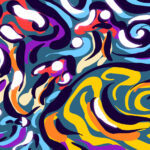The trial comes hot on the heels of a US study showing promise for the treatment.
Australian experts have welcomed the publication of a US study showing a single dose of the psychedelic psilocybin administered alongside psychological support was a safe and acceptable treatment for patients with anorexia nervosa.
The small phase I trial of 10 women also found that four patients met the threshold for remission after three months.
The findings, published in Nature Medicine come on the eve of a new clinical trial in Sydney which will examine the use of psilocybin-assisted psychotherapy in patients with anorexia nervosa, in a project known as Panorexia.
The first patient in the Panorexia trial is expected to start treatment in October. Professor Stephen Touyz, director of the Inside Out Institute, said they hoped to treat up to 36 anorexia nervosa patients in total, and he expected the trial to take up to two years to complete.
While Professor Touyz and other Australian experts welcomed the US study’s findings, they said the results needed to be taken in context and with caution.
Its small size and the short length needed were one major limitation. And while Professor Touyz said he was excited about the prospect of psilocybin helping to treat anorexia nervosa, there was still much that needed to be understood and validated in clinical trials.
“I think the media is suggesting that we found the magic bullet,” he told The Medical Republic.
“That might be well something in five years’ time we could be celebrating, but I think we mustn’t celebrate too early because we don’t have the data yet.”
The US researchers investigated the safety, tolerability and exploratory efficacy of a single 25mg dose of psilocybin, delivered alongside psychological support in 10 female adults 18–40 years of age with anorexia, who were then assessed for three months following the single dose.
No serious adverse events were reported by the participants and the acute effects of the psilocybin treatment were well-tolerated.
Qualitative, self-reported responses from the patients revealed that 90% regarded the psilocybin treatment as meaningful and positive, endorsing additional treatments if available.
Four participants demonstrated substantial decreases in eating-disorder scores at a three-month follow-up, qualifying for remission from eating-disorder psychopathology.
Dr Trevor Steward (PhD), a senior research fellow at the University of Melbourne, told TMR the study was an important step towards determining how safe and well-tolerated psilocybin was for patients with anorexia nervosa.
“The fact is that anorexia nervosa has the highest mortality rate of any psychiatric disorder,” he said. “There are no approved pharmaceutical interventions available for it – and that makes it so difficult for people with this disorder.”
He said psilocybin therapy had provided hope in other mental health disorders, notably by providing evidence that it could improve anxiety, cognitive flexibility and self-acceptance for some patients.
“These are all features of anorexia nervosa and the rationale for exploring psilocybin therapy as an option in the case of anorexia is strong,” Dr Steward said.
Associate Professor Gemma Sharp, leader of the body image and eating disorders research group at Monash University, said she was encouraged by the results of the US research.
“Having said that, this published research is very preliminary. It involved only 10 women with anorexia nervosa, five in partial remission, and an average BMI in the normal weight range rather than underweight,” the senior clinical psychologist at Alfred Health said.
Dr Claire Foldi (PhD), a senior research fellow at the Monash University Biomedicine Discovery Institute, said novel treatment strategies were urgently needed for anorexia nervosa.
“There is clear evidence of biological drivers of anorexia nervosa, including genetic predisposition and changes to brain function, and the work that we do in the lab will hopefully shed some light on more detailed targets for treatment,” she told TMR.
“The other issue is that not all individuals with anorexia nervosa have the same constellation of symptoms and so individualised approaches are needed.”
She said the “hype and hyperbole in the media about the potential of psychedelics as therapies is definitely a concern”.
“Not only because of the risks associated with self-medication outside of the tightly controlled and supervised settings of a clinical trial but also because it can lead to an expectation of positive effects – which we know from the Nature Medicine article and from psychedelic trials in other clinical populations don’t occur for every person,” she said.
“The concern here is that the variability in response profiles means that if a particular individual undergoing psychedelic therapy happens to be non-responsive to treatment, that this could actually make symptoms worse because of unmet expectations.”




